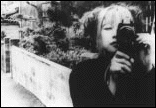|
|
 |
監督:大月奈都子 Director : Otsuki Natsuko |
| 1995年、情報誌ぴあが主催する映画フェスティバルにおいてビデオ作品としては初のグランプリを獲得した大月は、フェイクとしての個人映画あるいはプライベート・ドキュメンタリーの嘘と本当をあらわにする。彼女は義務として「映画」を撮ろうとするが、何が撮りたいのか決めかねている。そして唐突に町中でナンパされるシーンから映像ははじめられるが、すぐにそれは演出された映像であることが明らかになる。しかしその青年との会話で彼女は母が末期の癌であることをいきなり打ち明ける。こうしてシーンは彼女の思いつき、あるいは主人公の思いつきでのらりくらりと彼女のつぶやきとともに進行してゆくのだが、留守番電話に録音された親族のメッセージによって母の病状悪化、そして死が告げられる。結局彼女は母の映像を少ししか撮影することが出来なかった。「ほんとうはおかあさんを撮りたかったけど…撮ったとこは全部嘘や」といいながら彼女は撮影されるのを拒否する。この作品は計算された「思いつき」「気まぐれ」の現実逃避によって展開してゆきながら、逃避することの出来ない母の死という、現実の気まぐれに対処しかねる彼女、あるいは大月自身の姿を見せるのである。 | Otsuki won the Grand Prix at the Pia film festival in 1995: the first time that this prize had gone to a work on video. The work was a fake " personal film, " laying bare the truth and lies of the private documentary. Otsuki then had the duty of making a " film, " but she found it hard to decide what she wanted to shoot. The film starts suddenly with a flirting scene on the street but it soon becomes clear that this scene is being directed by Otsuki. As she is talking with a young man, Otsuki abruptly reveals that her mother has terminal cancer. The scene goes on, adlibbed by the director and the actor, accompanied by Otsuki's elusive whispering. At the same time we hear messages from the director's relatives on her answering machine, reporting that her mother's condition has taken a turn for the worse, and then that she has died. In the end Otsuki was only able to film her mother briefly. Saying, " I really did want to film my mother but everything I shot was a lie, " she refuses to be filmed herself. While this film unfolds through the accumulation of impulses and whims that escape reality, it also shows Otsuki finding it almost impossible to deal with the capricious reality that is her mother's inescapable death. |